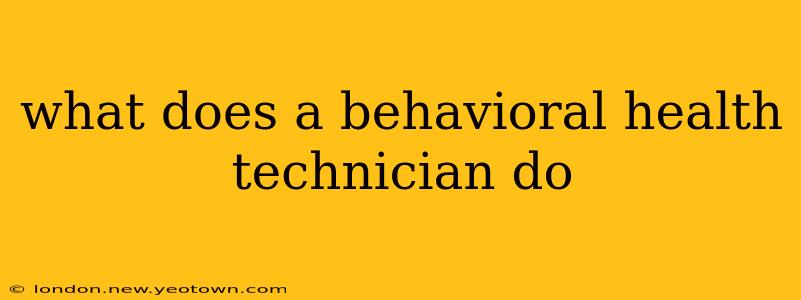What Does a Behavioral Health Technician Do? A Day in the Life
The sun rises, casting a gentle glow on the bustling scene at Meadowbrook Behavioral Health Center. Inside, Sarah, a Behavioral Health Technician (BHT), is already prepping for her day. She's not a doctor or therapist, but she’s a crucial part of the team, playing a vital role in the lives of individuals struggling with mental health challenges. What exactly does a BHT do? It's a multifaceted role, demanding patience, empathy, and a strong understanding of behavioral health principles. Let's follow Sarah through a typical workday to discover just that.
First, Sarah checks the daily schedule and medication lists. It's a critical step to ensure that each patient receives their prescribed medications at the correct time and dosage. This meticulousness underscores the significant responsibility BHTs carry. She then makes her rounds, checking on each patient, monitoring their mood, and noting any changes in their behavior. This isn't just a checklist; it's about building rapport, offering a listening ear, and recognizing subtle shifts that might signal a potential issue.
Next, it's time for group therapy. Sarah assists the therapist, ensuring a safe and supportive environment for the patients. Her duties might include preparing the room, taking notes, or even facilitating certain activities. Her presence provides reassurance and stability, especially for those who might feel anxious or withdrawn.
After group therapy, she might escort patients to appointments or activities, be it occupational therapy, art therapy, or simply a walk in the courtyard. These seemingly small actions are incredibly significant. They demonstrate care, foster independence, and contribute to a positive therapeutic environment.
Sarah's day isn't just about patient care. She also spends time on administrative tasks, documenting patient interactions, updating charts, and communicating with the treatment team. This meticulous record-keeping is crucial for effective treatment planning and continuity of care.
Later in the afternoon, Sarah leads a mindfulness session. She guides the patients through breathing exercises and meditation, helping them develop coping mechanisms for managing stress and anxiety. This proactive approach to mental wellbeing is a hallmark of modern behavioral health care.
Finally, before her shift ends, Sarah prepares for the night shift handover, carefully briefing her colleague on the progress and needs of each patient. This ensures smooth transitions and consistency in care.
What are the main duties of a behavioral health technician?
This question highlights the core responsibilities of a BHT. The main duties typically include:
- Direct Patient Care: Observing, monitoring, and documenting patient behavior; assisting with activities of daily living; providing emotional support.
- Medication Administration: Dispensing and monitoring medication, accurately recording administration times and patient responses.
- Therapeutic Support: Assisting with group and individual therapy sessions, engaging patients in therapeutic activities.
- Documentation and Record Keeping: Maintaining accurate and detailed patient records; communicating with the treatment team.
- Crisis Intervention: Responding effectively to behavioral emergencies and de-escalating potentially volatile situations.
What skills are needed to be a behavioral health technician?
Becoming a successful BHT requires a blend of hard and soft skills. These include:
- Strong Communication Skills: The ability to build rapport with patients, actively listen, and effectively communicate with colleagues and supervisors.
- Empathy and Compassion: Genuine care for patients and understanding of their struggles.
- Patience and Resilience: The ability to handle challenging behaviors and stressful situations with calmness and professionalism.
- Observation Skills: Keen attention to detail and ability to accurately record observations.
- Knowledge of Behavioral Health Principles: A solid understanding of mental health disorders and treatment approaches.
What education and training do you need to become a behavioral health technician?
The educational requirements vary by state and facility. However, most employers prefer candidates with a high school diploma or equivalent and some form of post-secondary training, such as a certificate or associate's degree in behavioral health or a related field. On-the-job training is also common.
Is a behavioral health technician a good career?
For those with a passion for helping others and a strong aptitude for working in a challenging yet rewarding environment, a career as a behavioral health technician can be incredibly fulfilling. It's a career where you can make a tangible difference in people's lives, witnessing firsthand the positive impact of your work. The demand for BHTs is growing, offering good job security and opportunities for career advancement.
Sarah's workday, though just a snapshot, reflects the complexity and importance of a BHT's role. It's a career that demands dedication and skill, but also offers profound rewards in contributing to the well-being of others. If you're considering a career in behavioral health, the role of a BHT is well worth exploring.

